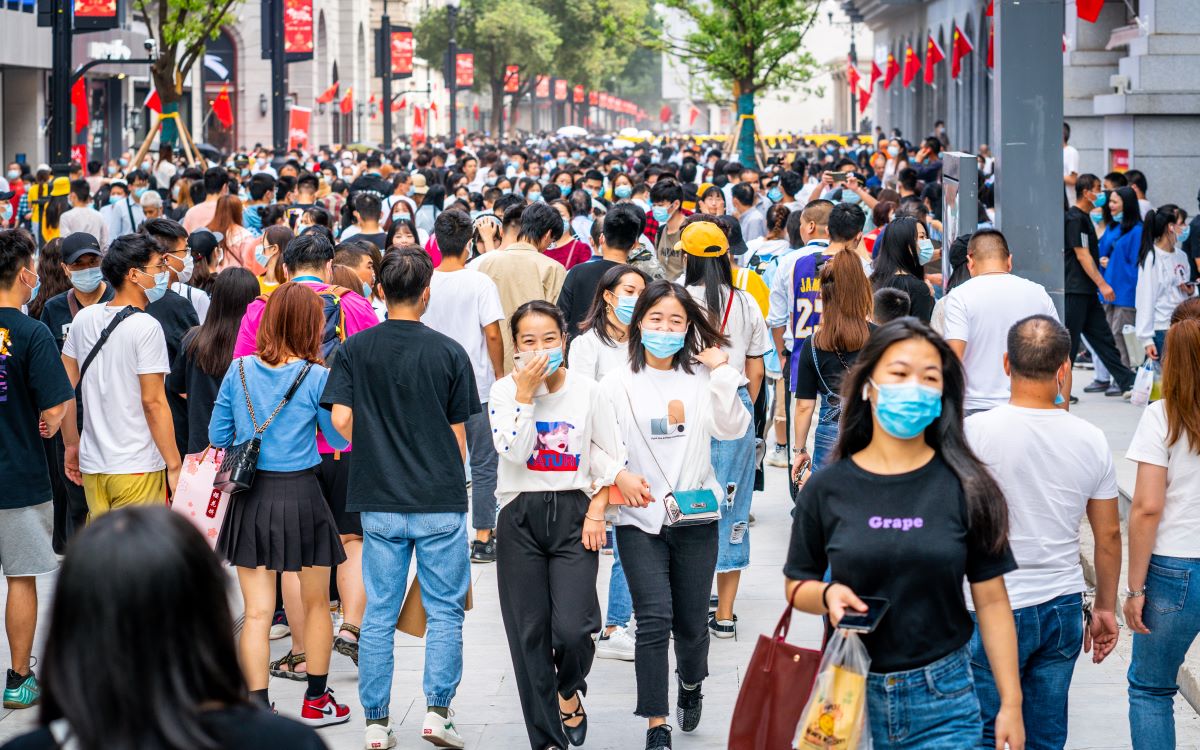China’s zero-Covid policy has weighed on the country’s economy for most of 2022, but recent policy changes show that the country’s financial markets may get a leg up. China reopening from the strict lockdowns is aiding investor sentiment, as seen by the gains posted in November, and Beijing has now announced the most significant changes yet to the zero-Covid policy.
After protests over Beijing’s Covid stance rocked the nation, China has officially revoked compulsory quarantine in hospitals and scrapped the use of health QR codes in public places. Earlier this month, violent protests at the Apple supplier Foxconn’s factory in Zhengzhou made headlines.
Social media videos showed factory workers attacking health officials in hazmat suits. Another recent video showed two health officials forcefully dragging a Chinese citizen to take him to the quarantine centre. There were also reports of health workers killing the pets of those taken to government quarantine centres as a precaution.
However, the new policy has immensely relaxed rules for Chinese citizens who have faced disruption in their daily lives for nearly three years. While there are a few exceptions, health checks have now largely been scrapped, and businesses can now implement their own measures for Covid-19 than adopt rules set down by the local governments.
China reopening to lead turnaround?
Over the course of 2022, China’s strict Covid policies hit the manufacturing sector the worst, whereas trade figures have dwindled.
Trade data released by China’s customs office showed that the country’s exports contracted by 8.7% YoY, while imports declined by 10.6% YoY in November. These are much higher figures than in October when exports shrank 0.3% and imports fell 0.7%.
The declining trade figures are largely linked to declining global demand, as high inflation and steep interest hikes shave off liquidity in the market. In November, China’s exports to the US fell by 13.2% YoY, in line with the decline seen in the previous month, whereas exports to Europe grew 1.5%. Additionally, China’s exports to the ASEAN region grew 2.9% YoY, which is a significant factor showing that global supply chains are realigning.
ING’s Chief Economist for Greater China, Iris Pang, points out that imports from Taiwan contracted 10.4% YoY in November, which indicates that raw materials used for the production of electronics goods had declined. “As we use semiconductors as an early indicator of growth, we believe that exports in the coming months should continue to contract,” writes Pang.
On the other hand, the surge in Covid-19 cases in November had seen a return of some strict measures by the Chinese government, which had led to protests around the major cities in the country.
China’s factory activity contracted to a seven-month low in November, with the official manufacturing purchasing managers index (PMI) coming in at 48.0, down from 49.2 in October. Any number below the 50 mark indicates a contraction in the manufacturing sector. Separately, services activity also took a hit in November, with the non-manufacturing PMI falling to 46.7 from 48.7 in October.
The prolonged lockdowns in the country have hit factories and overall production, with an analyst estimating that this will impact a quarter of the country’s GDP.
While the strict lockdowns are one factor, weakening domestic and foreign demand is reflected in a decline in new orders and new export orders. Now, the major question is whether China’s reopening can spur growth despite the global economic slowdown.
China reopening bets
The news of China reopening by doing away with some of the strict zero-Covid measures spurred a rally in the mainland as well as Hong Kong stocks, but the release of trade data later in the day dampened investor sentiment, with the Hang Seng China Enterprises Index closing 3.3% lower on December 7.
“China has eased its Covid-19 measures further, while a Politburo meeting yesterday (Dec. 6) pinpointed growth as the policy direction going forward. But we are not overly optimistic about either of these announcements leading to a significant uptick in economic growth,” writes ING’s Pang.
Last month, Goldman Sachs said that a full China reopening will boost the country’s equity markets by 20%, adding $2.6 tn in value.
Morgan Stanley also has taken a positive view of China and is placing bullish bets on the country, upgrading China equities to ‘overweight’ from ‘equal-weight’ after nearly two years. “Multiple positive developments alongside a clear path set towards reopening warrant an upgrade and index target increases for China,” Morgan Stanley analysts said in a research note.
However, Nomura has cautioned that China reopening may not prove to be as positive as estimated. “We caution that the road to reopening may be gradual, painful and bumpy,” Nomura analysts said in a note. “A massive wave of Covid infections in the next few months may disrupt production and supply chains to some extent.”
The onus now falls onto economic growth, which is suffering from the dual problem of Covid-19 and weakening demand. Investors are likely to keep an eye on policy moves and look out for any policy errors by Beijing.
“I believe China has started a new cycle of growth and recovery. At the party congress last month, it was confirmed that economic growth is now China’s number one priority. You can see that economic growth is the main solution for many of the challenges faced by China,” said Cheah Cheng Hye, Co-Chairman and Co-Chief Investment Officer at Value Partners Group.










 Australia
Australia China
China India
India Indonesia
Indonesia Japan
Japan Malaysia
Malaysia Philippines
Philippines Singapore
Singapore South Korea
South Korea Taiwan
Taiwan Thailand
Thailand Vietnam
Vietnam Germany
Germany Hong Kong
Hong Kong USA
USA Switzerland
Switzerland Singapore
Singapore
 United Kingdom
United Kingdom








